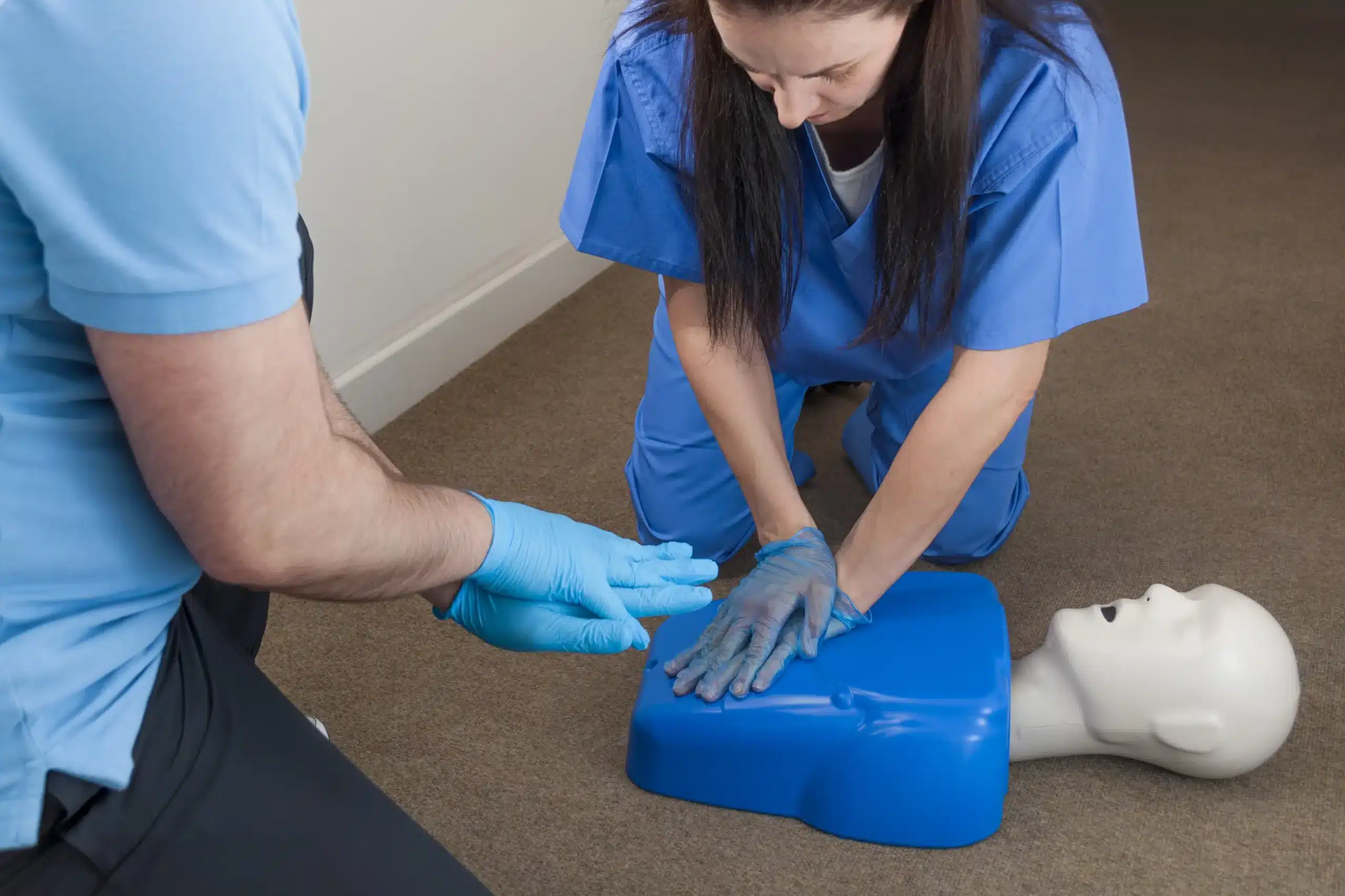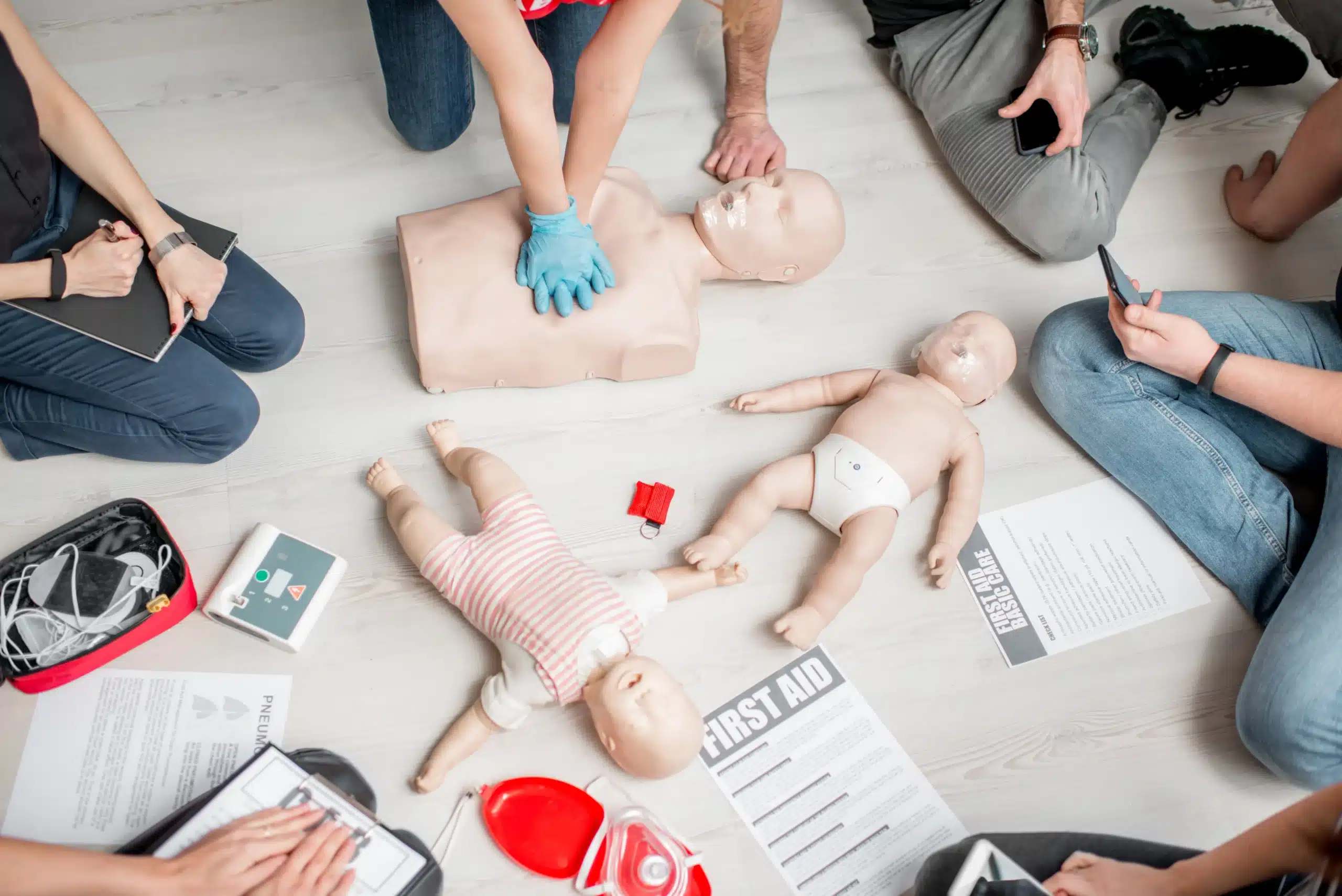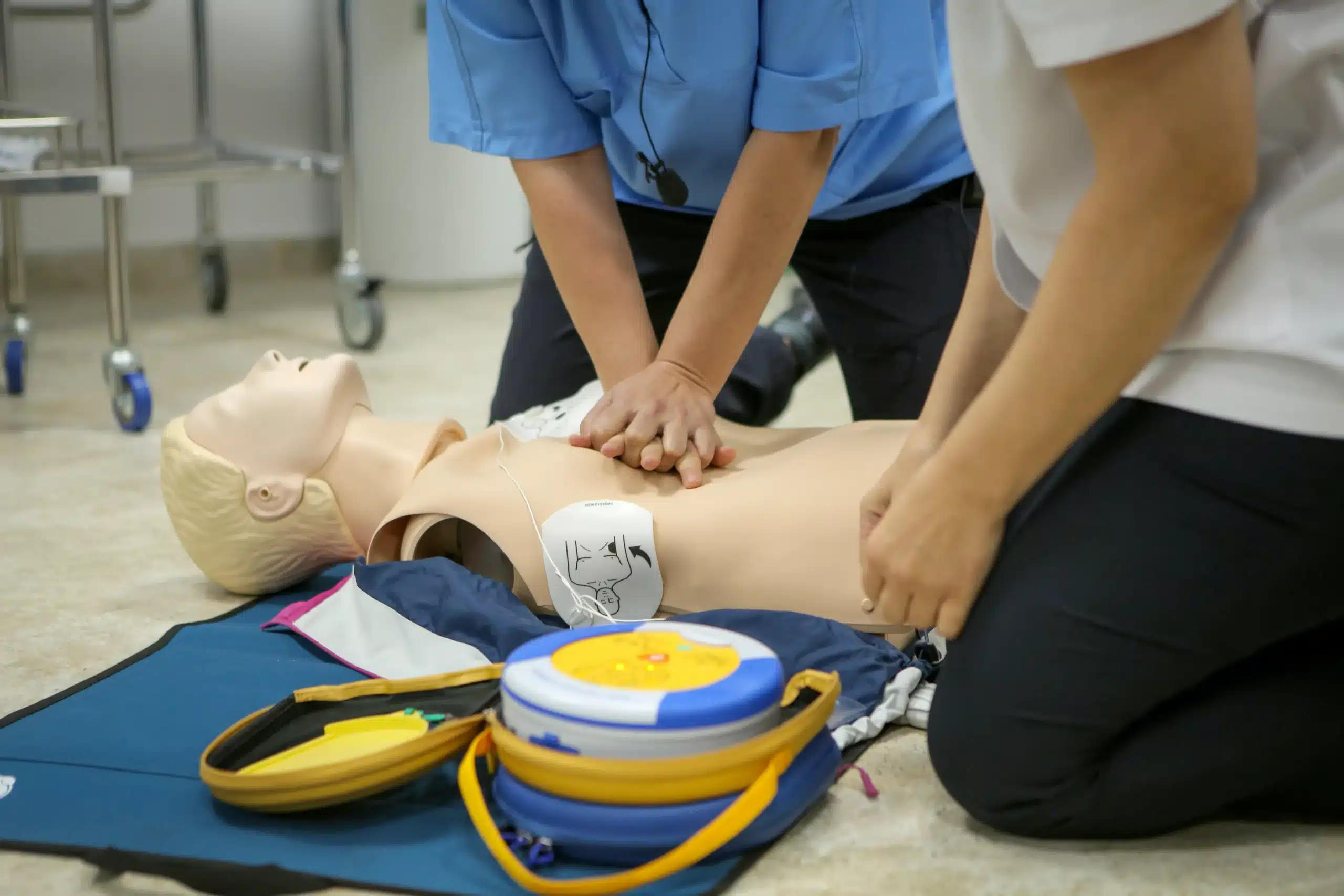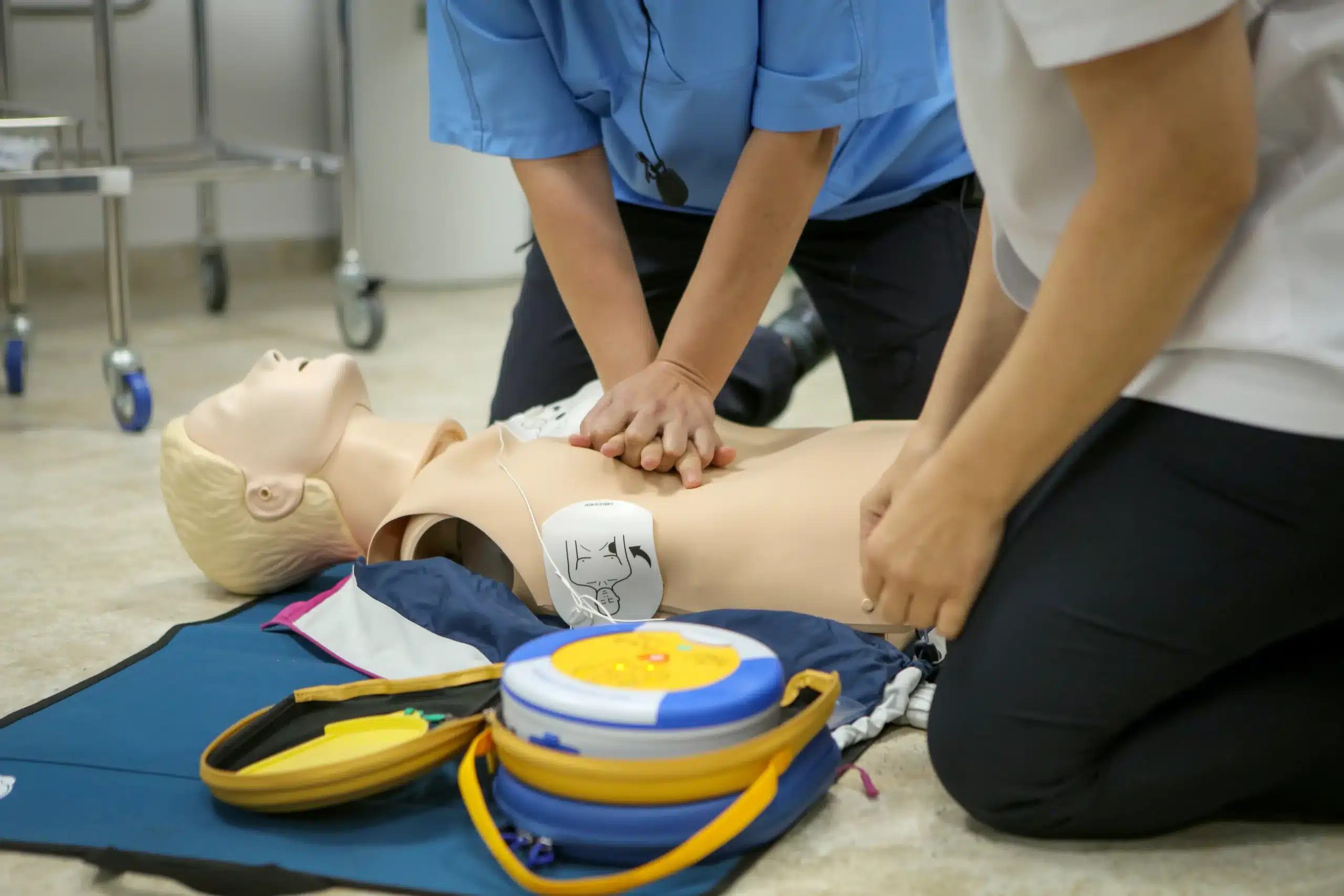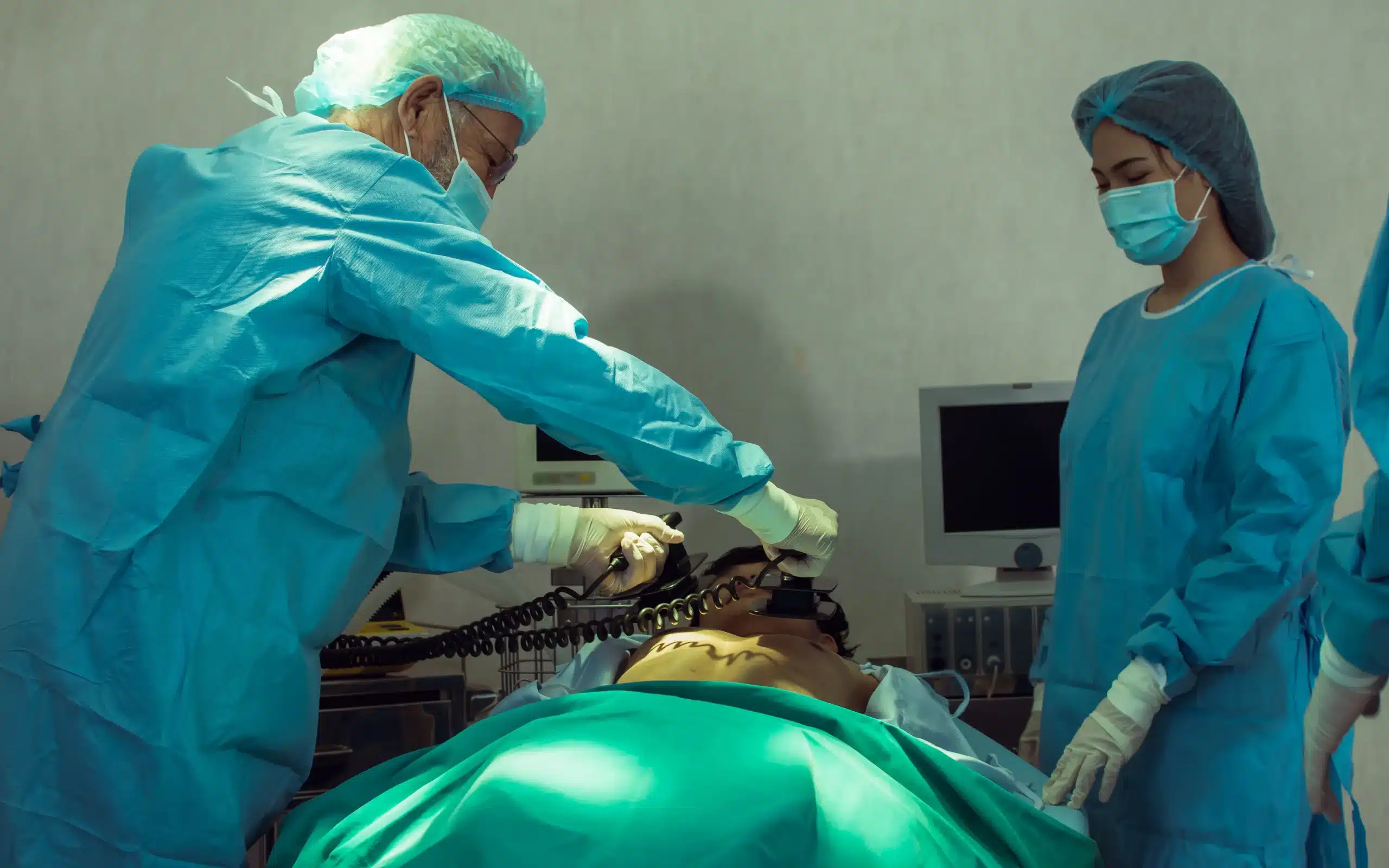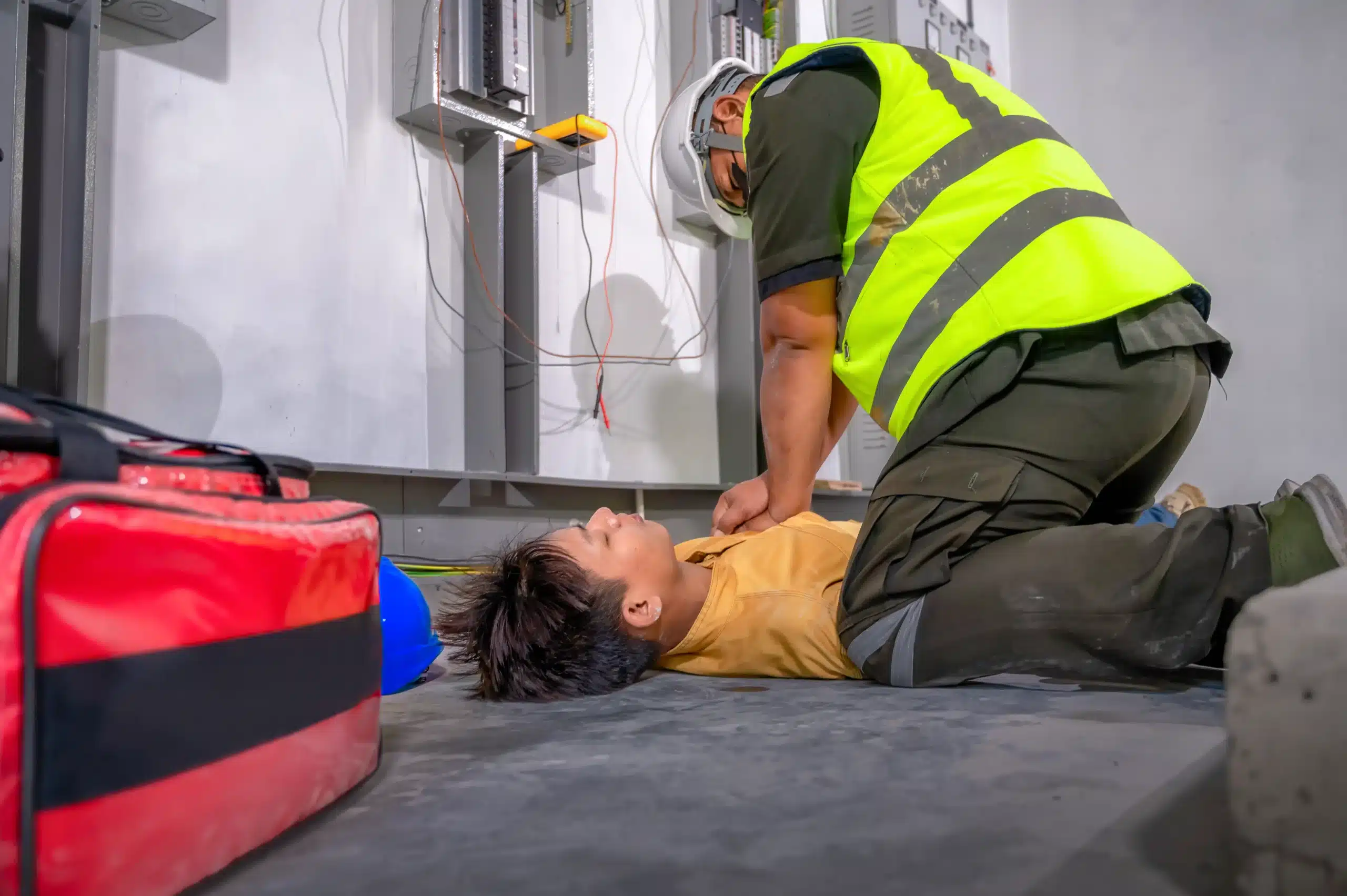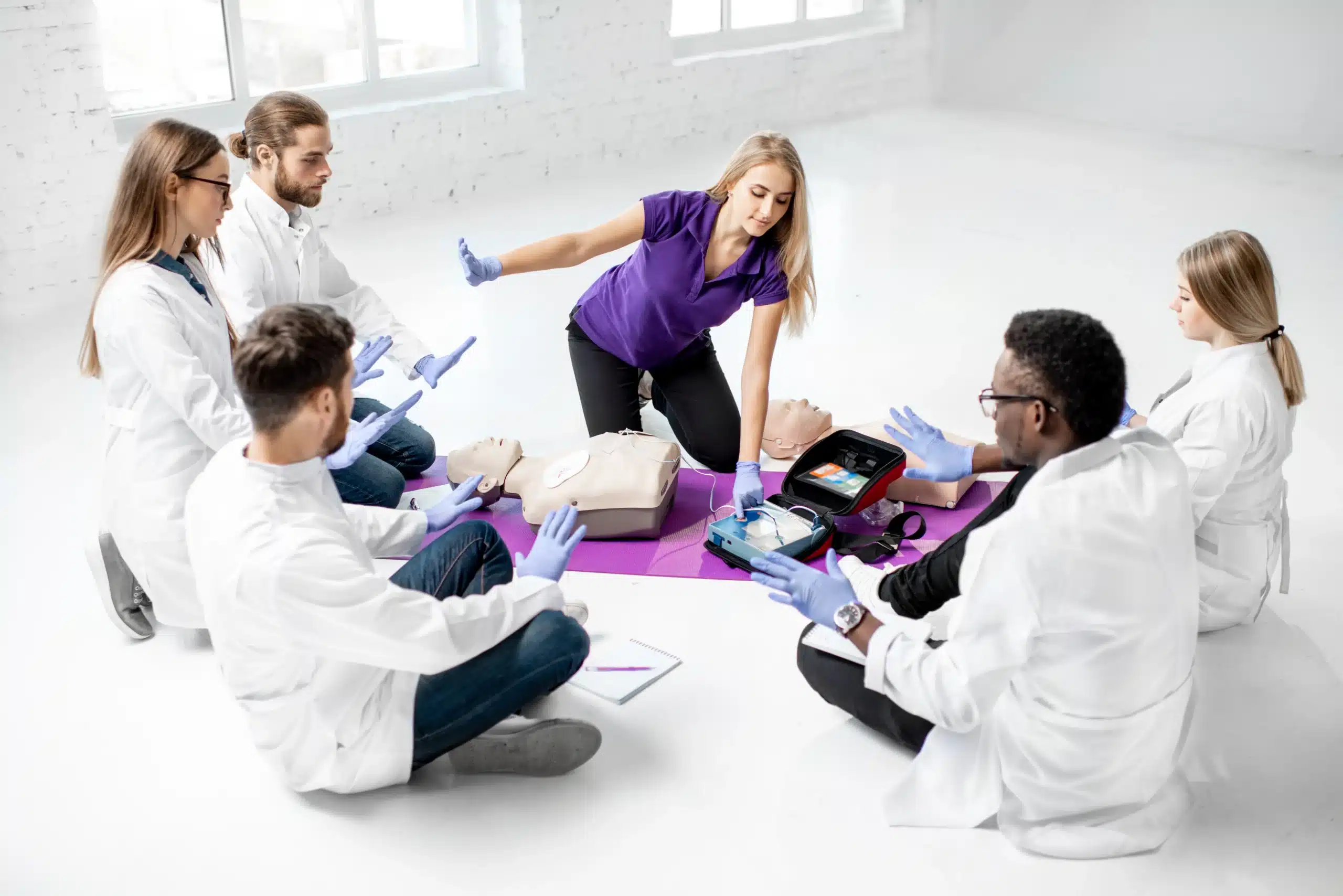Ready to become a certified lifesaver in Santa Cruz? BLS certification goes beyond basic CPR, equipping you with the advanced skills to handle medical emergencies confidently. Whether you’re a healthcare professional, a concerned parent, or simply someone who wants to make a difference, BLS courses in Santa Cruz can empower you to act decisively when it matters most. This comprehensive guide covers everything from course content and top providers to certification processes and common FAQs, giving you the knowledge you need to choose the right BLS course for your needs. Let’s explore how you can become a vital link in the chain of survival.
Key Takeaways
- BLS certification provides essential life-saving skills: Whether for a healthcare career or personal preparedness, BLS training empowers you to handle emergencies effectively. Explore options like blended learning for a convenient way to gain these crucial skills.
- Select a reputable BLS course provider: Prioritize certified instructors, smaller class sizes for individual attention, and positive student feedback. Quality training builds confidence and competence in real-world emergency situations.
- Maintain your BLS certification with ease: Leverage programs like RQI, combining online learning with efficient skills checks, to keep your credentials current. Regular renewal ensures you stay up-to-date and ready to respond.
What are BLS Courses & Why are They Important?
What is BLS?
Basic Life Support (BLS) is a level of medical care used for victims of life-threatening illnesses or injuries until they can be given full medical care at a hospital. It is a more advanced certification than CPR and is designed for healthcare professionals like doctors, nurses, and EMTs, as well as first responders. BLS includes everything in CPR training, plus additional techniques for handling cardiac arrest, respiratory problems, and airway obstructions. It also covers team dynamics and communication during emergencies. Think of BLS as the next step up from CPR, providing a broader skillset for those likely to encounter medical emergencies as part of their jobs.
Benefits for Healthcare Professionals & Others
BLS certification is essential for many healthcare careers and demonstrates a commitment to patient safety. It shows employers you have the skills to help in medical emergencies. For healthcare providers, maintaining a current BLS certification is often a job requirement and can be key for career advancement. Beyond the professional advantages, BLS training equips individuals with the ability to respond effectively to cardiac emergencies and potentially save lives. If you’re considering a career in healthcare, or simply want to be prepared to help in a crisis, getting your BLS certification is a smart move. Contact us today to learn more about our BLS courses in Santa Cruz.
Top BLS Course Providers in Santa Cruz
Finding the right BLS course provider is crucial for a positive and effective learning experience. Here’s a look at some of the top options in Santa Cruz:
Safety Training Seminars
Safety Training Seminars offers American Heart Association CPR classes in Santa Cruz. They provide a range of certifications, including BLS, ACLS, and PALS, plus First Aid training. Known for their competitive pricing, Safety Training Seminars offers a low price guarantee on their BLS renewal courses, making them a budget-friendly choice. Their Santa Cruz training center serves the surrounding areas, including Monterey and Capitola. You can explore their BLS course options on their website.
American Red Cross
With over half a million cardiac arrests occurring annually in the US, knowing CPR can be life-saving. The American Red Cross offers CPR and AED classes in Santa Cruz. They provide various learning formats, including in-person, online, and blended learning. Completing their in-person skills sessions earns you a two-year certification that meets OSHA standards.
HeartShare Training Services
HeartShare Training Services focuses on providing high-quality CPR and BLS training in Santa Cruz. They offer courses for both healthcare professionals and the general public, emphasizing practical skills and real-world scenarios.
Above Bar CPR
Above Bar CPR also provides comprehensive CPR and BLS training in Santa Cruz. Their courses cater to both healthcare providers and the general public, focusing on hands-on skills and real-world application. You can find reviews and more details on their Yelp page.
What to Expect in a BLS Course
This section covers what you’ll learn in a BLS course and how you’ll earn your certification. Whether you’re a healthcare provider or someone wanting to learn lifesaving skills, understanding the course content and process will help you feel prepared.
Course Content & Hands-on Training
BLS courses in Santa Cruz are designed for a wide range of participants, from healthcare professionals and first responders to teachers, childcare providers, and the general public. These BLS courses cover essential lifesaving techniques, including how to recognize the signs of a medical emergency, assess the situation, and administer appropriate care. The curriculum focuses on high-quality chest compressions, rescue breaths, and AED use, building upon CPR and first-aid fundamentals.
Hands-on training is a critical part of any BLS course. You’ll practice these skills in a controlled environment with experienced instructors. Many courses now offer a blended learning approach, combining online learning with in-person skills sessions for greater flexibility.
Certification Process & Validity
After successfully completing the course and skills test, you’ll receive an official American Heart Association (AHA) BLS certification card, valid for two years. This certification is nationally recognized.
The AHA’s Resuscitation Quality Improvement (RQI) program offers a streamlined path to BLS certification, particularly for healthcare professionals. RQI uses a flexible, skills-based approach to maintaining your credentials. It’s a modern and efficient way for medical professionals in Santa Cruz to earn and maintain their AHA BLS certification. This program typically involves online coursework combined with a hands-on skills evaluation.
BLS Course Costs & Schedules in Santa Cruz
Finding the right BLS course often comes down to balancing cost and scheduling. Let’s break down what you can expect in Santa Cruz.
Compare Provider Pricing
Shopping around for the best price on your BLS certification is smart. While quality training should be your priority, you also want to find a course that fits your budget. Safety Training Seminars offers a low-price guarantee on their CPR classes, including BLS, ACLS, and PALS certifications. Check their website for current rates. You can also compare their prices with other providers like the BLS Test Center, which lists a one-time fee of $34.99 for the BLS Healthcare Provider certificate. General CPR and AED training in Santa Cruz averages around $45 per person for a four-hour session, according to Thumbtack, giving you a benchmark for comparison.
Flexible Class Options & Duration
One of the best things about BLS certification in Santa Cruz is the flexible scheduling. Many providers understand that people have busy lives, so they offer options to fit various needs. Safety Training Seminars provides blended learning, allowing you to complete the online coursework at your own pace and then schedule a shorter, in-person skills session. This is especially helpful for those juggling work, family, or other commitments. For healthcare professionals, the American Heart Association’s RQI program (Resuscitation Quality Improvement) is a popular choice, streamlining the certification process by combining online learning with hands-on skills assessments. The BLS CPR Provider Heartcode course also offers a flexible format. Complete the online portion in just 1–2 hours and then schedule a skills test (40–60 minutes) at various testing sites. This adaptable structure makes it easier to fit BLS training into even the busiest schedules.
Online vs. In-Person BLS Courses
Pros & Cons of Each Format
When choosing a BLS course, consider which learning format best suits your needs and learning style: online, in-person, or blended learning. Each has its own advantages and disadvantages. Online courses offer unparalleled convenience and flexibility, allowing you to learn at your own pace from anywhere with an internet connection. This can be particularly helpful for those with busy schedules or limited access to transportation. However, online-only courses typically do not provide certification on their own, as hands-on skills demonstrations are essential for official American Heart Association recognition.
In-person courses, like those offered at Safety Training Seminars in Santa Cruz, provide the crucial hands-on training and direct instructor feedback necessary for proper skill development and certification. Practicing skills like chest compressions and rescue breaths in a real-world setting, under the guidance of a certified instructor, is invaluable for building confidence and ensuring you’re prepared for emergencies. However, in-person classes require you to adhere to a fixed schedule and travel to a specific location, which may be less flexible for some.
Blended Learning Options
Blended learning courses offer a happy medium, combining online learning convenience with essential hands-on practice. These courses typically involve completing the cognitive portion online at your own pace, followed by an in-person skills session to demonstrate competency and receive your certification. This format offers the flexibility of online learning while still ensuring you receive the necessary hands-on training and instructor feedback. Safety Training Seminars’ unique RQI program is a great example of this blended learning model, providing a modern and efficient way for healthcare professionals to obtain their BLS, ACLS, and PALS certification cards. This approach allows participants to refresh their knowledge and skills regularly, ensuring they are always prepared to provide high-quality care.
Choose the Right BLS Course in Santa Cruz
Finding the right BLS course can feel overwhelming, but focusing on a few key factors can simplify your decision. Here’s what to consider when choosing a BLS provider in Santa Cruz:
Instructor Qualifications
The quality of your training depends heavily on the instructor’s expertise. Look for courses led by certified instructors with extensive experience. Safety Training Seminars is a woman-owned AHA Training Center, meaning their instructors meet the rigorous standards of the American Heart Association. This ensures your training aligns with the latest guidelines and best practices in emergency cardiovascular care. Verify instructor certifications and look for providers committed to ongoing training for their staff. This commitment ensures you learn the most up-to-date, effective life-saving techniques.
Class Size & Individual Attention
While large lectures might seem efficient, smaller class sizes offer significant advantages for BLS training. A more intimate learning environment allows for more interaction with the instructor and more opportunities to ask questions. Safety Training Seminars prioritizes this personalized approach in their Santa Cruz CPR classes. This focus on individual attention ensures you get the hands-on practice and personalized feedback necessary to confidently perform BLS skills in real-life emergencies. Look for a provider that emphasizes hands-on training and offers ample opportunities for practice and feedback.
Course Reviews & Testimonials
Reading reviews and testimonials from past students offers valuable insights into a course’s effectiveness. Yelp reviews often highlight positive experiences with Safety Training Seminars, emphasizing practical skills and confidence gained. Real-world stories from participants underscore the value of quality BLS training and can help you gauge a course’s potential impact. Take the time to research and choose a program with a proven track record.
Prepare for Your BLS Course
Getting ready for your BLS course doesn’t have to be stressful. A little preparation goes a long way in ensuring you get the most out of your training. Here’s what you need to know:
What to Bring
While your BLS provider will supply the mannequins and other training equipment, there are a few things you should bring to class. A notebook and pen are helpful for jotting down key concepts and reminders. Comfortable clothing is also recommended, as you’ll be actively participating in hands-on training scenarios. Most importantly, bring a positive attitude and a willingness to learn! As Santa Cruz CPR Classes points out, BLS training teaches you to “recognize the signs of a medical emergency, assess the situation, and administer appropriate care.” Being engaged and ready to participate will help you absorb this crucial information.
Pre-Course Study Materials
While not always mandatory, reviewing pre-course materials can significantly enhance your learning experience. Familiarizing yourself with basic concepts beforehand allows you to focus on mastering the practical skills during the course. Many providers offer online resources or recommend specific study guides. For healthcare professionals seeking BLS certification, the American Heart Association’s RQI program, offered by providers like Santa Cruz CPR Classes, offers a flexible blend of online learning and in-person skills testing. This approach allows you to learn the material at your own pace and then demonstrate your proficiency in a hands-on setting. This blended learning style is becoming increasingly popular, as highlighted in this article about Safety Training Seminars’ new training school in Santa Cruz. Check with your course provider to see what pre-course resources they offer.
Common BLS Course Concerns & FAQs
This section addresses some common questions and concerns about BLS courses. Hopefully, this information helps you feel prepared and confident about signing up for a class. If you have other questions, don’t hesitate to contact us. We’re happy to help!
Prerequisites & Physical Demands
One common question is whether there are any prerequisites for BLS courses. Generally, there aren’t any formal educational requirements. However, BLS certification focuses on healthcare providers, so it’s geared toward people working or planning to work in a medical setting. CPR training can be physically demanding, requiring participants to perform chest compressions and other physical maneuvers. If you have any physical limitations, it’s wise to consider your fitness level and perhaps discuss any concerns with your doctor or the course instructor before registering for a BLS course.
BLS vs. CPR Certification
Many people wonder about the difference between BLS and CPR certification. While related, they cater to different audiences. BLS (Basic Life Support) certification is designed for healthcare professionals, such as doctors, nurses, paramedics, and other licensed medical personnel. CPR/AED certification, on the other hand, is generally for anyone, including non-medical personnel, who wants to learn how to perform CPR. BLS certification is more comprehensive than standard CPR training. It covers everything in a CPR class, but also includes additional techniques for managing cardiac arrest, respiratory distress, and obstructed airways in a professional healthcare setting. If you’re a healthcare provider or aspire to be one, BLS certification is likely the more appropriate choice. For others seeking basic life-saving skills, a CPR/AED course may be a better fit.
Renew Your BLS Certification
Renewal Process & Requirements
To keep your BLS certification current, you’ll need to renew it every two years. After completing a renewal course, you’ll receive an updated American Heart Association certification card valid for two years. This regular renewal ensures healthcare providers stay up-to-date on the latest resuscitation guidelines and techniques. Safety Training Seminars is a trusted provider of BLS renewal courses in Santa Cruz, known for quality instruction and convenient scheduling. For more information about their offerings and reputation, check out their Yelp reviews.
Continuing Education Options
Santa Cruz offers a range of training programs for both initial BLS certification and recertification. Safety Training Seminars provides various courses, including BLS, ACLS, PALS, and CPR. They often combine online learning with in-person skills sessions for a flexible approach to continuing education. This blended learning format helps healthcare professionals efficiently meet their certification requirements while improving their skills. You can learn more about their training programs in this press release. The American Heart Association’s RQI (Resuscitation Quality Improvement) program, also available through Safety Training Seminars, offers a streamlined renewal process for medical professionals. Focused on continuous learning and skill maintenance, the RQI program is a popular choice for healthcare providers.
Additional Resources & Post-Certification Support
Once you’ve earned your BLS certification, staying sharp and up-to-date is key. This section covers resources to help you maintain your skills and connect with the wider Santa Cruz healthcare community.
Online Materials & Refresher Courses
Maintaining your BLS skills doesn’t always mean another full course. High-quality programs like the American Heart Association’s RQI program offer a streamlined approach to keeping your certification current. RQI uses a combination of online learning and brief skills sessions, making it a convenient option for busy professionals. Many providers, including Safety Training Seminars, incorporate this blended learning model into their course offerings for BLS, ACLS, and PALS certifications. This flexible approach allows you to review materials online at your own pace and then demonstrate your skills in person. It’s a win-win for both knowledge retention and scheduling ease. Look for providers who offer refresher courses or online resources to help you brush up on specific techniques or protocols between certifications.
Community Support & Networking
Connecting with other BLS-certified professionals can be a valuable way to stay engaged and informed. Consider joining online forums or local groups in Santa Cruz where you can share experiences, ask questions, and learn from others in the field. Safety Training Seminars offers a range of courses, creating a hub for individuals interested in CPR and first aid. These classes often provide opportunities to network with fellow participants, building a sense of community around emergency preparedness. Learning from others’ experiences and perspectives can be incredibly enriching, especially when it comes to applying your BLS skills in real-world scenarios. Plus, knowing you’re part of a supportive network can boost your confidence in responding to emergencies.
Related Articles
- BLS Certification for Healthcare Providers in Capitola – Santa Cruz CPR Classes
- Why CPR is Important in Healthcare – Santa Cruz CPR Classes
- ACLS HeartCode Capitola: Your Certification Guide – Santa Cruz CPR Classes
- First Aid Classes in Santa Cruz: Your Complete Guide
- BLS CPR Classes in Santa Cruz, CA – Santa Cruz CPR Classes
Frequently Asked Questions
What’s the main difference between BLS and CPR certification? BLS (Basic Life Support) certification is more advanced than CPR and is designed for healthcare professionals and first responders. It includes everything covered in a CPR course, along with additional skills for handling cardiac arrest, respiratory issues, and airway obstructions in a professional setting. CPR/AED certification is suitable for anyone wanting to learn basic lifesaving skills, including those outside the medical field.
How long is a BLS certification valid, and how do I renew it? BLS certification is typically valid for two years. Renewal involves completing a refresher course and skills test before your current certification expires. Look for providers offering streamlined renewal options, like the RQI program, which combines online learning with shorter in-person skills sessions.
Are there any physical requirements for taking a BLS course? While there aren’t any formal educational prerequisites for BLS courses, the training does involve physical activity, including performing chest compressions and other hands-on techniques. If you have any physical limitations or concerns, it’s always a good idea to talk to your doctor or the course instructor before signing up.
What should I expect during a BLS course? Expect a combination of classroom instruction, demonstrations, and hands-on practice. You’ll learn how to recognize medical emergencies, provide high-quality CPR, use an AED, and manage airway obstructions. Many courses now offer blended learning, allowing you to complete some coursework online before attending an in-person skills session.
How do I choose the right BLS course provider in Santa Cruz? Look for a provider offering AHA-certified courses taught by experienced instructors. Consider class size – smaller classes often allow for more personalized attention and feedback. Check reviews and testimonials from past students to get a sense of the quality of instruction and the overall learning experience. Finally, compare pricing and schedules to find a course that fits your budget and availability.
